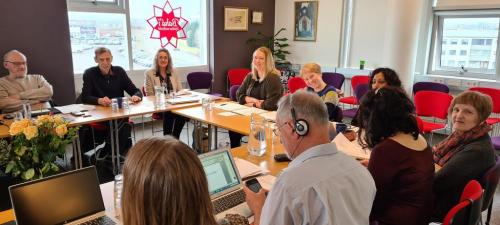Registration to and deregistration from the Bahá'í faith
When an individual decides to register as a member of the Bahá'í Faith, it implies a declaration of belief in Bahá'u'lláh, as the newest Manifestation of God for today and following his laws and teachings to the best of his or her abilities. Thus starts a path of learning which involves an endeavour towards personal growth and service to the Faith and mankind. Shoghi Effendi, Guardian of the Faith, defined the criterion of Bahá'í faith and practise such:
„Full recognition of the station of the Báb, the Forerunner; of Bahá’u’lláh, the Author; and of ‘Abdu’l-Bahá, the True Exemplar of the Bahá’í religion; unreserved acceptance of, and submission to, whatsoever has been revealed by their Pen; loyal and steadfast adherence to every clause of ‘Abdu’l-Bahá’s sacred Will; and close association with the spirit as well as the form of Bahá’í Administration throughout the world.“
Registering as a member of the Bahá'í Faith in Iceland is done by sending a request to be registered to the thjodarskrifstofa [hjá] bahai [punktur] is (Bahá’í National Office) (thjodarskrifstofa [hjá] bahai [punktur] is), or a Local Spiritual Assembly in the locality in which one resides, if a Local Spiritual Assembly has be established there, with information about name, kennitala, address, telephone number and email address. Registration into the Bahá'í Community (Bahá'í samfélagið) with Þjóðskrá (Registers Iceland) is also necessary and can be done electronically at the following address: https://skra.is/english/people/religion-and-life-stance/. Please note that registration with Þjóðskrá affects only to which registered religious community one's parish taxes are sent but Þjóðskrá's registration does not constitute the membership list of the Bahá'í Community.
Parents and guardians who wish to register their children in the same way should send an email to the Bahá'í National Office in the same manner with information about the children that are to be registered and register them with Þjóðskrá according to Þjóðskrá's rules.
Resignation from the Bahá'í Faith is done by notifying a Bahá'í Local Spiritual Assembly, if such an Assembly is established in the person's locality, or the Bahá'í National Office. It is likely that the Assembly in question or its representative will be in contact about the reasons for the resignation before recording the resignation. Membership in the Bahá'í Community is completely up to the individual. If an individual deregisters from the Bahá'í Community with Þjóðskrá no notification is sent to the Bahá'í National Office. Discrepancy between the Bahá'í Community's records and the records of Þjóðskrá will not be apparent until these two lists are compared, but one or more years can pass before the lists are compared. It is therefore important to inform the institutions of the Bahá'í faith about changes as soon as possible.
Participation in Bahá'í Community life
Bahá’u’lláh says:
„The fundamental purpose animating the Faith of God and His Religion is to safeguard the interests and promote the unity of the human race, and to foster the spirit of love and fellowship amongst men. Suffer it not to become a source of dissension and discord, of hate and enmity.“
The Bahá'í Faith has methods to foster a spirit of love and fellowship. Bahá'í Community life involves that Bahá'ís come together regularly to pray, consult and enjoy social camaraderie, for example at Ninteen Day Feasts (community gatherings every 19 days) in each local Bahá'í Community. The Nineteen Day Feast is for all age groups and is a joyous occasion where reading of prayers and holy writings, consultation about community matters and social camaraderie come together at one event. It is also the basis of the Bahá'í Administration, a space for interaction between the Local Spiritual Assembly and the local community. - Bahá'í consultation is a method for decision-making where it is endeavoured to come to a conclusion about important matters without partisanship and conflict, where each one tries to bring forth ideas for the solution to problems without connecting the one's own ideas to his or her own self. It is also a method to come to a common understanding about the teachings of Bahá'u'lláh.
In addition to this space for consultation and interaction, which the Nineteen Day Feast is, each Local Spiritual Assembly communicates with its local community, for example with newsletters, emails or direct communication with individuals. The National Spiritual Assembly has it own email distribution list for Bahá'ís for announcements and information, such as a Nineteen Day Feast letter, which is shared with the Bahá'ís for each feast.
Part of being a Bahá'í is to vote in Bahá'í elections and assume office if one is elected to serve on an Assembly or as a delegate to the National Convention. Any electioneering or running for office is not permitted.
Bahá'ís who have reached 18 years of age have the right to vote and can vote in elections for a Local Spiritual Assembly or delegates to the National Convention. Bahá'ís who have reached 21 years of age are eligible to be voted to serve on Bahá'í institutions. The Universal House of Justice wrote the following about Bahá'í elections:
The manner of participation by all adult members of the community in these elections is a distinguishing feature of the System of Bahá’u’lláh; for it is a bounden duty that confers a high privilege upon every Bahá’í to select, as a responsible citizen of the new world being brought into existence, the composition of the institutions having authority over the functioning of the Bahá’í community. In this regard, indifference and neglect on the part of any believer are alien to the spirit of the Cause …
In describing Bahá’í elections, Shoghi Effendi, through a letter written on his behalf, conveyed that “Bahá’í electoral procedures and methods have, indeed, for one of their essential purposes the development in every believer of the spirit of responsibility. By emphasizing the necessity of maintaining his full freedom in the elections, they make it incumbent upon him to become an active and well-informed member of the Bahá’í community in which he lives.”

